![]()
![]()
![]()
Use LEFT and RIGHT arrow keys to navigate between flashcards;
Use UP and DOWN arrow keys to flip the card;
H to show hint;
A reads text to speech;
51 Cards in this Set
- Front
- Back
|
NERVOUS SYSTEM |
A network of cells that carries information to and from all parts of the body. |
|
|
NEUROSCIENCE |
A branch of the life sciences that deals with the structure and functions of neurons, nerves and nervous tissue. |
|
|
NEURON |
The basic cell that makes up the nervous system and that receives and sends messages within that system. |
|
|
RESTING POTENTIAL |
The state of the neuron when not firing a neural impulse. |
|
|
ACTION POTENTIAL |
The release of the neural impulse consisting of a reversal of the electrical charge within the axon. |
|
|
HORMONES |
Chemicals released into the bloodstream by endocrine glands. |
|
|
OVARIES |
Female gonads. |
|
|
TESTES |
Male gonads. |
|
|
HABITUATION |
The way the brain deals with unchanging information in the environment. |
|
|
LIGHT ADAPTATION |
The recovery of the eye's sensitivity to visual stimuli in light after exposure to darkness. |
|
|
DOUBLE BLIND STUDY |
Study in which neither the experimenter or subjects know if the subjects are in the experimental or control group. |
|
|
SINGLE BLIND STUDY |
Study in which the subjects do not know if they are in the experimental or control group. |
|
|
PLACEBO EFFECT |
Phenomenon in which the expectations of the participants in a study can influence their behavior. |
|
|
CRITICAL THINKING |
Making reasoned judgements about claims |
|
|
HERTZ |
Cycles of waves per second, a measurement of frequency. |
|
|
PINNA |
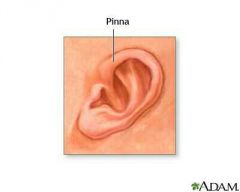
The visable part of the ear. |
|
|
AUDITORY CANNAL |

The short tunnel that runs from the pinna to the eardrum. |
|
|
PITCH |
How high or low a sound is. |
|
|
GUSTATION |
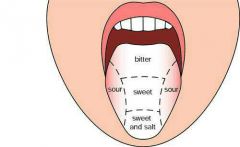
The sense of taste. |
|
|
OLFACTION |

Ability to smell. |
|
|
SKIN SENSES |
Sensations of touch, temperature, pressure and pain. |
|
|
PROXIMITY |
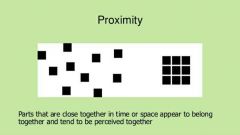
Tendency to perceive objects that are close to each other as being part of the same grouping. |
|
|
SIMILARITY |
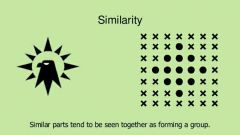
Tendency to perceive things that look similar as being part of the same group. |
|
|
PERCEPTION |
The method by which sensations experienced are interpreted in some meaningful fashion. |
|
|
CLOSURE |
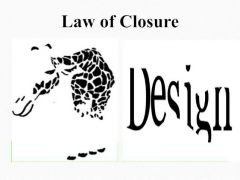
The tendency to complete figures that are incomplete. |
|
|
DEPTH PERCEPTION |
The ability to perceive the world in 3 dimensions. |
|
|
CLASSICAL CONDITIONING |
Learning to make an involuntary response to a stimulus other than the original, natural stimulus that normally produces the reflex. |
|
|
POPULATION |
The entire group of people or animals in which the researcher is interested. |
|
|
CORRELATION |
A measure of the relationship between two or more variables. |
|
|
INDEPENDENT VARIABLE |
Variable in an experiment that is manipulated by the experimenter. |
|
|
DEPENDENT VARIABLE |
Variable in an experiment that represents the measurable response or behavior of the subjects in the experiment. |
|
|
TRICHROMACTIC THEORY |
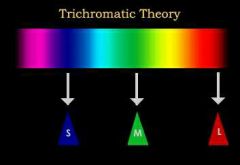
Theory of color vision that proposes three types of cones: red, blue, and green. |
|
|
AFTER IMAGE |
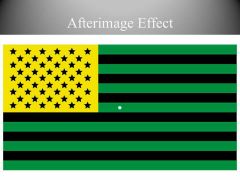
Images that occur when a visual sensation persists for a brief time even after the original stimulus is removed. |
|
|
WAKING CONSCIOUSNESS |
State in which thoughts, feelings and sensations are clear, organized and the person feels alert. |
|
|
ALTERED STATE OF CONSCIOUSNESS |
State in which there is a shift in the quality or pattern of mental activity as compared to waking consciousness. |
|
|
SLEEP DEPRIVATION |
Any significant loss of sleep, resulting in loss of concentration and irritability. |
|
|
DELTA WAVES |
Long, slow waves that indicate the deepest stage of sleep. |
|
|
NIGHTMARES |
Bad dreams occurring during REM sleep. |
|
|
SLEEPWALKING/SOMNABULISM |
Occurring during sleep, an episode of moving around or walking around in one's sleep. |
|
|
INSOMNIA |
The inability to get to sleep/stay asleep/ get good quality sleep. |
|
|
NARCOLEPSY |
Sleep disorder in which a person falls into REM sleep without warning. |
|
|
HYPNOSIS |
A state of consciousness in which a person is especially susceptible to suggestion. |
|
|
PSYCHOACTIVE DRUGS |
Drugs that alter thinking, perception, and memory. |
|
|
WITHDRAWAL |
Physical symptoms that can include nausea, pain, tremors, crankiness, resulting from a lack of an addictive drug in the body. |
|
|
PHYSICAL DEPENDENCE |
Condition occurring when a person's body becomes unable to function normally without a particular drug. |
|
|
STIMULANTS |
Drugs that increase the functioning of the nervous system. |
|
|
DEPRESSANTS |
Drugs that decrease the functioning of the nervous system. |
|
|
HALLUCINOGENICS |
Drugs including marijuana that produce hallucinations or increased feelings of relaxation or intoxication. |
|
|
COCAINE |
A natural drug derived from the leaves of a coca plant. |
|
|
CAFFEINE |
A mild stimulant found in coffee, tea and several other plant based substances. |
|
|
REFLEX |
An involuntary response that is not under personal control or choice. |

